|
Councillor
Don
Fisher
1933 - 2011
|
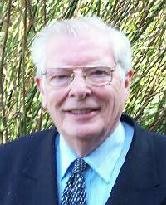
|
There were few people
in Bourne who did not know of Don Fisher. He devoted more than a quarter of a century to the affairs of this town and his
was a familiar face in our streets, having been mayor twice and holding office with innumerable organisations devoted to the welfare of its citizens.
Yet Bourne was his home only by chance although his roots in administration and what he called
"a commitment to the cause" went back to his boyhood years in the north of England and a willingness to serve that never left him.
Donald Fisher was born on 11th September 1933 at Woodlands, Doncaster, South Yorkshire, the son of electrician Elijah Fisher and his wife Mabel, who came from a prominent railway family. His was a middle class childhood and he was fortunate to obtain a place at the Woodlands Secondary School, the equivalent of today's grammar school, where he revelled in social history which gave him his first taste of organisation because he soon became secretary of the Field Club, a group devoted to the closer study of a subject that was to become a lifelong passion.
On leaving school at the age of 16, he enrolled as a cadet with the West Riding Constabulary and a career with the police force beckoned but he found the army a more attractive option and in 1951 at the age of 17˝, enlisted as a regular soldier and was sent to the guards' depot at Caterham in Surrey for basic training before being posted to the Coldstream Guards at Wellington Barracks, next to Buckingham Palace in London, where most of their ceremonial duties were carried out.
He served with the colours for 15 years and his military career took him to many parts of the world. While based at Krefeld in Germany, there was a young subaltern in his battalion called Lord Bingham who later became notorious as the missing Earl of Lucan. Said Don: "I got to know him quite well and found him to be a very quiet chap and although I'm convinced that he is now dead, I cannot believe for one moment that he ever murdered anyone not unless perhaps it was in a fit of rage. He was just too gentle to be that violent."
Don was subsequently posted to Templar Barracks in Nairobi where he was involved in the changeover of Kenya from a British colony to an independent nation in 1964. From there he went to Aden where he saw action in which he lost several of his colleagues while others were wounded. He was seconded on detachment from his regiment to the Trucial Oman Scouts, part of the ruler's national army in the Arabian oil state, and although still a colour sergeant, he became acting governor of the prison in
Sharjah, a small centre with 20 or so prisoners, where he stayed on active service for two years before taking the troopship back home to England with the ribbon of the General Service Medal on his chest. He returned to Wellington Barracks and duties of an administrative and less exciting nature although he did take part in
four
Trooping of the Colour ceremonies in Horse Guards Parade.
|
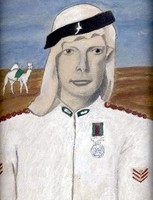 |
A
portrait of Don in his uniform of
the Trucial Oman
Scouts, oil on board, painted
by his father Elijah
Fisher in
1974. |
His career came to a crossroads in 1967 when he took the route that led him to Bourne. Don's younger sister Eunice was studying at York University and while visiting her he met Celia Rodgers, a former pupil of Bourne Grammar School and the girl with whom she was sharing a flat. They hit it off but decided that the army was not the place for a wife and so he applied for discharge. Celia graduated with a BA degree in English Literature and in 1968 they married and moved to London, living first in Kensington and then in Uxbridge, he working as a manager for Lilley and Skinner in Harrow Road, London, and she for the Civil Service.
But the marriage was not to last and they were divorced after four years. There were no children from the partnership but because of it, Don became acquainted with Celia's family, well known in Bourne for their butchery and farming interests, and it was during one visit that he had a chance meeting in the street with Eric Cross, the furniture dealer who was then building his warehouse store in Manning Road, now occupied by Anglia Furnishings. He asked Don if he would like the job of manager, the offer was accepted and in 1972, Bourne became his future home.
He never remarried but devoted his energies to the community which became his consuming interest and four years later he was elected to Bourne Town Council, representing the old Dyke and Twenty ward, since absorbed into the East Ward, and remained a town councillor
for 35 years, serving two terms as mayor, from 1983-84 and again in 1998-99.
He was an ardent royalist and one of the most vivid of his early memories was on his birthday in September 1948 when the King and Queen visited Doncaster to see the famous St Leger race. The town had turned out to line the streets for even a fleeting glimpse of the Royal couple but 15-year-old Don was allowed to stand near to the entrance of the Mansion House with a group of other children and as she passed, the Queen, later the Queen Mother, turned smiling to wave at the party. "I was so thrilled that I could barely speak for the rest of the day", he recalled later. Then, while serving in the army, he came into close contact with the Royal Family several times and actually met the Queen Mother in person. "But nothing was quite the same as the first time I saw her", he said. In 1985, he was honoured with an invitation to attend one of the annual garden parties at Buckingham Palace and stayed as a guest with his former regiment, the Coldstream Guards, at Wellington Barracks. No one in Bourne therefore was better qualified to mastermind
Bourne's Silver Jubilee celebrations in the summer of 1977 and he was also the first to sign the Book of Remembrance opened at the Town Hall after the Queen Mother died in March 2002.
His politics were Conservative and he served as a member of South Kesteven District Council
from 1979-2007 and on Lincolnshire County Council from 1981-89. But his first love
was always with the town council where politics played little part. "Our business
was always conducted far quicker without such complications", he said. "Politics do not matter at this level. I strongly believe that the Local Government Act of 1974 took far too many powers away from the immediacy of the parishes in the small towns and placed them in distant organisations in far away places and that cannot be right."
Don has been involved in numerous other organisations. He was a member of the Coldstream Guard Association and the Royal British Legion, serving as chairman of the Bourne branch
from 1996-2001 when he received one of the legion's highest awards, the Gold Badge, together with several certificates of appreciation for his work. He was a founder member of the Civic Society in 1978 and its chairman from 1994-96.
One of his main interests was the village of Twenty where he served as secretary of the
village hall management committee from 1977, a job he took for just six months but held office for 21 years and
also served for a similar period on the village hall management committee at Dyke. He
was also a tireless worker for charity and from 1989, was a member of Bourne United Charities, serving for a period as chairman of the organisation which he considered to be one of the most important in Bourne.
|
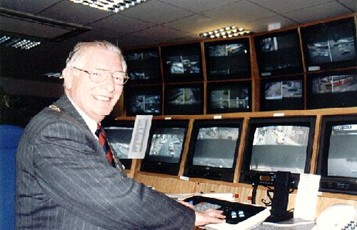 |
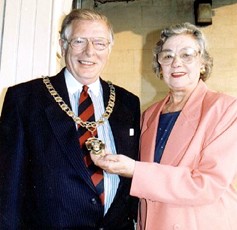 |
|
Councillor Fisher,
when Mayor of Bourne, officially opened the closed circuit
television (CCTV) facility for the town at the police control
headquarters in Grantham on Thursday 22nd October 1998. The system
involved the installation of surveillance cameras at various
vantage points around Bourne in a bid to reduce crime. He is also
pictured here at the mayoral
installation ceremony at Bourne Town Hall on
Tuesday 19th May 1998
with the outgoing mayor, Councillor Shirley Cliffe. |
Don's other interests included education. He was a governor of Bourne Grammar School for ten years and
became the longest serving governor of the Robert Manning Technology
College as well as completing spells on the board of the Abbey Road
Primary School (from 1981) and of Morton Primary and the Willoughby Special Schools. He
was also a committee member of the South Lincolnshire Branch of the Alzheimer Disease Society and
was chairman of the Kesteven Museums Panel (1985-89), former secretary of Age Concern in Bourne, an organiser of the Bourne Evergreen Club, during which time he arranged meals for the elderly, and vice chairman of the Bourne branch of Disability Links. Said Don: "I always felt it extremely important to become involved with these organisations if you want to do something positive for the town." He
was also an active supporter of the Bourne Outdoor swimming pool, sitting on the trust committee, and
was a co-opted member of the Bourne Chamber of Trade and Commerce.
He also completed a spell as a local historian of some repute, tracing the antecedents of many prominent Bourne families, keeping a large archive of photographs, documents and memorabilia relating to the town and its past residents, while his history of the village of Twenty, published to mark the millennium in the summer of 2000, was sold out.
Don retired in 1995 but this merely released him to give more time to his community work. His former wife's grandfather Harry Barnatt, a member of the Bourne milling family and a well-known local character, died in
1977 and left his only child, Mrs Kath Rodgers, Don's mother-in-law, the house in West Road, appropriately called Barnatt House, that subsequently passed to him and
became his home. Don suffered a stroke in 2001 and was later diagnosed
with Parkinson’s disease but this failed to dampen either his spirit or his enthusiasm for public work and he continued to attend meetings and
keep appointments. His commitment to public service was undiminished and although he refused
to discuss personal involvement, he was known to provide practical as well as advisory help and more than one person or organisation in Bourne has been known to say: "Don Fisher has been very good to us."
His life after moving to Bourne was one of dedication to public service. He explained: "I love Bourne. It has so much character and I will always fight to preserve things like the church and the Red Hall. It is institutions such as this that are the very essence of our town and must be protected at all costs. I think that in finding this place to live, almost by accident, I made a very fortunate choice."
Many will agree that this fortuitous circumstance was also of great
benefit to the people of Bourne who took Don Fisher to their hearts. In
March 2010, Don moved to the Cedars Retirement Home in Bourne and the
following year he decided to retire from public life and finally stood
down at the local government elections in May 2011. Although less active
than he was, he retained an interest in local affairs and remained in
contact with many old friends until his death on Saturday 5th November
2011.
|
Don Fisher's funeral was held at the Abbey Church on Monday 21st
November 2011 followed by cremation at Peterborough and was attended
by civic leaders and representatives from the many organisations to
which he had belonged including the Bourne branch of the British
Legion who carried their standards. In February 2013, his ashes were
interred in the town cemetery. |
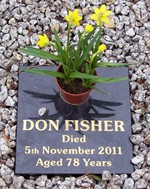 |
|
ON STAGE WITH OLIVIER
AN EVERLASTING MEMORY for Don was a
remarkable encounter with one of our greatest thespians, Laurence
Olivier. How the two should not only meet but also share the same
stage can only be described as one of those highly unusual
coincidences that make life so interesting.
During his army career he was a lance-sergeant at Chelsea Barracks
in London during the mid-1950s. Laurence Olivier was appearing in
the title role of Shakespeare’s Julius Caesar at the Old Vic and the
producer was in need of extras to play Roman soldiers in some scenes
and what better place to find them than at Chelsea Barracks where
the appeal went out for volunteers. Six willing guardsmen jumped at
the chance of earning a little extra cash and so for the next few
weeks, Don found himself on stage three nights a week playing a
legionnaire and carrying a standard, ready to welcome Olivier when
he made his entrance in a chariot to be greeted by his cohorts who
chorused: “Hail, Caesar!” “They were the only words we spoke”,
recalled Don. “We were on stage for about ten minutes but we each
got five shillings a night and it was great fun but as soon as the
curtain went down we were off to the local for a pint. After all, we
could afford it.” |
REVISED FEBRUARY 2013
See also Don Fisher gets VIP
treatment

Go to:
Main Index Villages
Index
|




